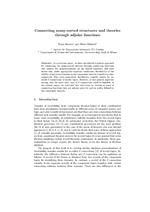LATPub314: Unterschied zwischen den Versionen
Aus International Center for Computational Logic
Marcel Lippmann (Diskussion | Beiträge) KKeine Bearbeitungszusammenfassung |
Marcel Lippmann (Diskussion | Beiträge) KKeine Bearbeitungszusammenfassung |
||
| (2 dazwischenliegende Versionen desselben Benutzers werden nicht angezeigt) | |||
| Zeile 1: | Zeile 1: | ||
{{Publikation Erster Autor | {{Publikation Erster Autor | ||
|ErsterAutorVorname= | |ErsterAutorVorname=Franz | ||
|ErsterAutorNachname=Baader | |ErsterAutorNachname=Baader | ||
|FurtherAuthors=S. Ghilardi | |FurtherAuthors=S. Ghilardi | ||
| Zeile 20: | Zeile 20: | ||
}} | }} | ||
{{Publikation Details | {{Publikation Details | ||
|Abstract=In a previous paper, we have introduced a general approach for | |Abstract=In a previous paper, we have introduced a general approach for connecting two many-sorted theories through connection functions that behave like homomorphisms on the shared signature, and have shown that, under appropriate algebraic conditions, decidability of the validity of universal formulae in the component theories transfers to their connection. This work generalizes decidability transfer results for so-called E-connections of modal logics. However, in this general algebraic setting, only the most basic type of E-connections could be handled. In the present paper, we overcome this restriction by looking at pairs of connection functions that are adjoint pairs for partial orders defined in the component theories. | ||
connecting two many-sorted theories through connection functions | |||
that behave like homomorphisms on the shared signature, and have shown | |||
that, under appropriate algebraic conditions, decidability of the | |||
validity of universal formulae in the component theories transfers to | |||
their connection. This work generalizes decidability transfer results | |||
for so-called E-connections of modal logics. However, in | |||
this general algebraic setting, only the most basic type of | |||
E-connections could be handled. In the present paper, we | |||
overcome this restriction by looking at pairs of connection functions | |||
that are adjoint pairs for partial orders defined in the component | |||
theories. | |||
|ISBN= | |ISBN= | ||
|ISSN= | |ISSN= | ||
| Zeile 51: | Zeile 39: | ||
year = {2005}, | year = {2005}, | ||
} | } | ||
}} | }} | ||
Aktuelle Version vom 25. März 2015, 16:34 Uhr
Connecting Many-Sorted Structures and Theories through Adjoint Functions
Franz BaaderFranz Baader, S. GhilardiS. Ghilardi
Franz Baader, S. Ghilardi
Connecting Many-Sorted Structures and Theories through Adjoint Functions
Proceedings of the 5th International Workshop on Frontiers of Combining Systems (FroCoS'05), volume 3717 of Lecture Notes in Artificial Intelligence, 2005. Springer
Connecting Many-Sorted Structures and Theories through Adjoint Functions
Proceedings of the 5th International Workshop on Frontiers of Combining Systems (FroCoS'05), volume 3717 of Lecture Notes in Artificial Intelligence, 2005. Springer
- KurzfassungAbstract
In a previous paper, we have introduced a general approach for connecting two many-sorted theories through connection functions that behave like homomorphisms on the shared signature, and have shown that, under appropriate algebraic conditions, decidability of the validity of universal formulae in the component theories transfers to their connection. This work generalizes decidability transfer results for so-called E-connections of modal logics. However, in this general algebraic setting, only the most basic type of E-connections could be handled. In the present paper, we overcome this restriction by looking at pairs of connection functions that are adjoint pairs for partial orders defined in the component theories. - Forschungsgruppe:Research Group: AutomatentheorieAutomata Theory
@inproceedings{ BaaderGhilardiFroCoS05,
address = {Vienna (Austria)},
author = {F. {Baader} and S. {Ghilardi}},
booktitle = {Proceedings of the 5th International Workshop on Frontiers of Combining Systems (FroCoS'05)},
publisher = {Springer-Verlag},
series = {Lecture Notes in Artificial Intelligence},
title = {Connecting Many-Sorted Structures and Theories through Adjoint Functions},
volume = {3717},
year = {2005},
}
